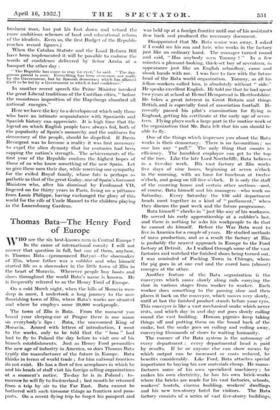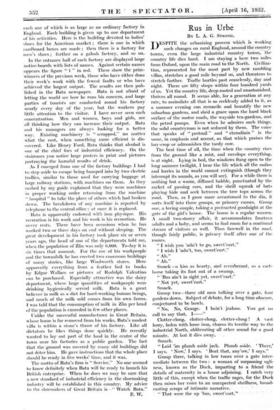Thomas Bata—The Henry Ford of Europe
WHO arc the six best-known men in Central Europe? In the cause of international comity I will not answer that question in full, but one of them, anyhow, is Thomas Bata—(pronounced Batya)—the shoemaker of Zlin, whose father was a cobbler and who himself started life as a shoemaker in the little town of Zlin in the heart of Moravia. Wherever people buy boots and shoes throughout the world Bata's name is known. He is frequently referred to as the Henry Ford of Europe. On a cold March night, when the hills of Moravia were deep in snow, I undertook a long journey to the now flourishing town of Zlin, where Bata's works are situated and where he employs some 20,000 workpeople.
The town of Zlin is Bata. From the moment you board your sleeping-car at Prague there is one name on everybody's lips: Bata, the uncrowned King of Moravia. Armed with letters of introduction, I went to the works, only to be told that the " boss " had had to fly to Poland the day before to visit one of his branch establishments. Just as Henry Ford personifies the new age of industry in America, so does Thomas Data typify the manufacturer of the future in Europe. Bata thinks in terms of world trade; for him national frontiers do not exist. He has a fleet of ten aeroplanes in which he and his heads of staff visit his foreign selling organizations at a moment's notice. To-day he is in Poland; to- morrow he will fly to Switzerland; last month he returned from a trip by air to the Far East. Bata cannot be bothered with such tiresome things as frontiers and pass- ports. On a recent flying trip he forgot his passport and was held up at a foreign frontier until one of his assistants flew back and produced the necessary document. Disappointed that Mr. Data senior was away, I asked if I could sec his son and heir, who works in the factory just like an ordinary hand. The manager turned round and said, "Has anybody seen Tommy ? " In a few minutes a pleasant-looking, thick-set boy of seventeen, in appearance just like an English schoolboy, came and shook hands with Inc. I was face to face with the future head of the Bata world organization. Tommy, as all his fellow-workers called him, is absolutely without " side." He speaks excellent English. He told me that he had spent two years at school at Hemel Hempstead in Hertfordshire. He takes a great interest in Great Britain and things British, and is especially fond of association football, lb. recently passed his pilot's examination for flying in England, getting his certificate at the early age of seven- teen. Flying plays such a large part in the routine work of the organization that Mr. Bata felt that his son should be able to fly. One of the things which impresses you about the Bata works is their democracy. There is no favouritism ; no one has any "pull." The only thing that counts is efficiency. The humblest employee can get to the top of the tree. Like the late Lord Northcliffe, Bata believes in a five-day week. His vast factory at Zlin works five days of nine hours, beginning at seven o'clock in the morning, with an hour for luncheon at twelve o'clock, and going on till five o'clock. It is only the staff of the counting house and certain other sections—and, of course, Data himself and his managers—who work on Saturday. Every Saturday the 150 odd department beads meet together in a kind of "parliament," when they discuss the past week and the future programme. - Data himself" cheeks in "just like any of his workmen. He served his early apprenticeship at a cobbler's last, and there -is nothing he asks his workpeople to do that he cannot do himself. Before the War Bata went to live in America for a couple of years. He studied methods of mass production, and as a result the factory at Zlin is probably the nearest approach in Europe to the Ford factory at Detroit. As I walked through some of the vast factories and watched the finished shoes being turned out, I was reminded of Packing Town in Chicago, where the pig goes in at one end and the cured ham (almost) emerges at the other. Another feature of the Bata organization is the conveyers which move slowly along rails carrying the shoe in various stages from worker to worker. Each worker does something to the passing shoe and then places it back on the conveyer, which moves very slowly, until at last the finished product stands before your eyes. This conveyer is like a vast mechanical snake which never rests, and which day in and day out goes slowly coiling round the vast building. Human pigmies keep taking things off and putting them on the broad back of the snake, but the snake goes on coiling and coiling away, conveying thousands of shoes to waiting humanity. The essence of the Data system is the autonomy of every department ; every departmental head is paid by results. If he or anyone else can show means by which output can be increased or costs reduced, he benefits considerably. Like Ford, Bata attaches special importance to buying his raw materials cheap. He manu- factures some of his own specialized machinery; he makes his own electricity, he has his own brick-works where the bricks are made for his vast factories, schools, workers' hostels, cinema building, workers' dwellings and his new ten-storey hotel for visitors. The Data factory consists of a series of vast live-storey buildings, each one of Which is as large as an ordinary factory in England. Each building is given up to One department of his activities. Here is the building devoted to ladies' shoes for the American market ; there - is one in whieh cardboard boxes are made ; then there is a factory for men's shoes ; further on a galosh factory, and so- on.
In the entrance hall of each factory are displayed large notice-boards with lists of names. Against certain names appears the figure "1" in red. These show. the prize- winners of the previous week, those who have either done their week's work with the fewest faults or who have achieved the largest output. The results are then pub- lished in the Bata newspaper. Bata is not afraid of letting the world see how he runs his concern, and large parties of tourists are' conducted round his factory nearly every day of the year, but the workers pay little attention to the visitor. I have never seen such concentration. Men and women, boys and girls, arc all thinking how they can increase their output. Bata mid his managers are always looking for -a better way. Existing machinery is "scrapped," no matter what the cost, when something more efficient is dis- covered. Like Henry Ford, Bata thinks that alcohol is one of the chief foes of industrial efficiency. On the staircases you notice large posters in print and pictures portraying the harmful results of drink.
As I emerged from one of the factory buildings I had to step aside to escape being bumped into by two electric trollies, similar to those used for carrying baggage at large railway stations, with machines on them. As they rushed by my guide explained that they were machines in proper working order returning from the machine " hospital " to take the place of others which had broken down, The breakdown of any machine is reported by telephone to the central office ; at once it is replaced.
Bata is apparently endowed with iron physique. His recreation is his work and his work is his recreation. He never rests. There have been occasions when he has worked two or three days on end without sleeping. The great development in his factory took place six or seven years ago, the head of one of the departments told me, when the population of Zlin was only 6,000. To-day it is six times that amount.' For the use of his workpeople and the townsfolk he has erected two enormous buildings of many stories, like large Woolworth stores. Here apparently everything from a feather bed to books by Edgar Wallace or pictures of Rudolph Valentino can be purchased. Especially attractive was the dairy department, where large quantities of workpeople were drinking hygienically served milk. Bata is a great believer in milk as a diet for hard-working human beings, and much of the milk sold comes from his own farms. I was told that the consumption of milk in Zlin per head of the population is exceeded in few other places.
Unlike the successful manufacturer in Great Britain, whose home is far removed from his works, Bata's modest villa is within a stone's throw of his factory. Like all dictators he likes things done quickly. He recently wanted to lay out part of the land in the centre of the town near his factories as a public garden. The fact that the ground was covered by many old buildings did not deter him. He gave instructions that the whole place should be ready in five weeks' time, and it was.
The motto of Bath's firm is "Service." No one seemed to know definitely when Bata will be ready to launch his British enterprise. When he does we may be sure that a new standard of industrial efficiency in • the shoemaking industry will be established in this country. My advice to the shoemakers of Great Britain is—" Watch Bata."
E. W.









































 Previous page
Previous page